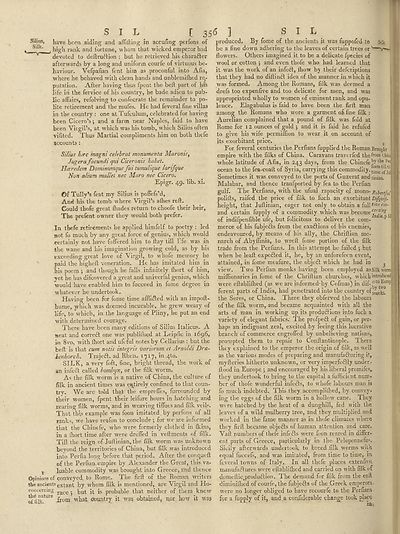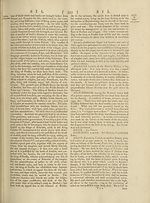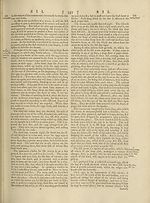Encyclopaedia Britannica, or, a Dictionary of arts, sciences, and miscellaneous literature : enlarged and improved. Illustrated with nearly six hundred engravings > Volume 19, Scripture-SUG
(400) Page 356
Download files
Complete book:
Individual page:
Thumbnail gallery: Grid view | List view

f!
Silius,
Silk.
S I L [ 356 ]
have been aiding and afTifting in accufing perfons of produced
Silk.
high rank and fortune, whom that wicked emperor had
devoted to deftruftion : but he retrieved his charadler
afterwards by a long and uniform courfe of virtuous be¬
haviour. Vefpanan fent him as proconful into Alia,
Avhere he behaved with clean hands and unblemifhed re,-
putation. After having thus fpent the bell part of his
life in the fervice of his country, he bade adieu to pub¬
lic affairs, refolving to confecrate the remainder to po¬
lite retirement and the mufes. He had feveral fine villas
in the country : one at Tufculum, celebrated for having
been Cicero’s •, and a farm near Naples, faid to have
been Virgil’s, at which was his tomb, which Silius often
vifitcd. Thus Martial compliments him on both thefe
accounts:
Silius Jure magni celebrat monumenta Maronis,
Jugera facundi qui Ciceronis habet.
Hceredem Dojninumque fid tumulique larifque
Non alium mallet nec Maro nec Cicero.
Epigr. 49. lib. xi.
Of Tully’s feat my Silius is poffefs’d.
And his the tomb where Virgil’s afhes reft.
Could thofe great (hades return to choofe their heir,
The prefent owner they would both prefer.
In thefe retirements he applied himfelf to poetry : led
Hot fo much by any great force of genius, which would
certainly not have fuffered him to ftay till life was in
the wane and his imagination growing cold, as by his
exceeding great love of Virgil, to whofe memory he
paid the higheft veneration. He has imitated him in
his poem •, and though he falls infinitely fhort of him,
yet he has difeovered a great and univerfal genius, which
would have enabled him to fucceed in fome degree in
whatever he undertook.
Having been for fome time affli&ed with an impoft-
hume, which was deemed incurable, he grew weary of
life, to’which, in the language of Pliny, he put an end
with determined courage.
There have been many editions of Silius Italicus. A
seat and correff one was publifned at Leipfic in 1696,
in 8vo, with fhort and ufcful notes by Cellarius : but the
beft is that cum notis integris variorum et Arnoldi Dra-
kenborch. Trajett. ad Rhen. 1717, in 410.
SILK, a very foft, fine, bright thread, the work of
an infect called bombyx, or the filk worm.
As the filk worm is a native of China, the culture of
filk in ancient times was entirely confined to that coun¬
try. We are told that the empreffes, furrounded by
their women, fpent their leifure hours in hatching and
rearing filk worms, and in weaving tiffues and filk veils.
That this example was foon imitated by perfons of all
ranks, we have reafon to conclude •, for we are informed
that the Chinefe, who were formerly clothed in (kins,
in a fhort time after were dreffed in veftments of filk.
Till the reign of Juftinian, the filk worm was unknown
beyond the territories of China, but filk was introduced
into Perfia long before that period. After the conqueft
of the Perfian, empire by Alexander the Great, this va-
5 luable commodity was brought into Greece, and thence
Opinions of conveyed to Rome. The firft of the Roman writers
the ancients extant by -whom filk is mentioned, are Virgil and Ho-
concerning race . ^ut it is probable that neither of them knew
.from what country it was obtained, nor how it wa?
the nature
of, (ilk>
S I L
By fome of the ancients it was fuppofed to
be a fine down adhering to the leaves of certain trees or
flowers. Others imagined it to be a delicate fpecies of
wool or cotton $ and even thofe who had learned that
it was the work of an infeft, (how by their deferiptions
that they had no diftindl idea of the manner in which it
was formed. Among the Romans, filk -was deemed a
drefs too expenfive and too delicate for men, and was
appropriated wholly to women of eminent rank and opu¬
lence. Elagabulus is faid to have been the firft man
among the Romans who wore a garment ofi fine filk :
Aurelian complained that a pound of filk was fold at
Rome for x 2 ounces of gold j and it is faid he refufed
to give his wife permiflion to wear it on account of
its exorbitant price. 2
For feveral centuries the Perfians fupplied the Roman Brought
empire with the filks of China. Caravans traverfed the from chk
whole latitude of Afia, in 243 days, from the Chinefe ^ M
ocean to the fea-coaft of Syria, carrying this commodity. ^ jJ
Sometimes it was conveyed to the ports of Guzerat andtinian.
Malabar, and thence tranfported by fea to the Perfian
gulf. The Perfians, with the ufual rapacity of mono-
polifts, raifed the price of (ilk to fuch an exorbitant
height, that Juftinian, eager not only to obtain a full
and certain fupply of a commodity which was become^
of indifpenfible ufe, but felicitous to deliver the com- ” ^
merce of his fubjedis from the exadlions of his enemies,
endeavoured, by means of his ally, the Chriftian mo¬
narch of Abyflinia, to wreft fome portion of the filk
trade from the Perfians. In this attempt he failed ; but
when he leal! expecied it, he, by an unforefeen event,
attained, in fome mtafure, the objedl which he had in
view. Two Perfian monks having been employed asSilkworm
miflionaries in fome of the Chriftian churches, which introduced
were eftabliftied (as we are informed-by Cofmas) in dif-j^10^10!
ferent parts of India, had penetrated into the country of^j^
the Seres, or China. There they obferved the labours
of the filk worm, and became acquainted with all tbe
arts of man in working up its produdlions into fuch a
variety of elegant fabrics. The profpedl of gain, or per¬
haps an indignant zeal, excited by feeing this lucrative
branch of commerce engroffed by unbelieving nations,
prompted them to repair to Conftantinople. There
they explained to the emperor the origin of filk, as well
as the various modes of preparing and manufadluring it,
myfteries hitherto unknown, or very imperfedlly under-
flood in Europe 5 and encouraged by his liberal promifes,
they undertook to bring to the capital a (ufficicnt num?
her of thofe rvonderful infecls, to whofe labours man is
fo much indebted. This they accomplifhed, by convey¬
ing the eggs of the filk worm in a hollow cane. They
were hatched by the heat of a dunghill, fed with the
leaves of a wild mulberry tree, and they multiplied and
worked in the fame manner as in thofe climates where
they firft became objedls of human attention and care.
Vaft numbers of thefe infefts were foon reared in differ¬
ent parts of Greece, particularly in the Peloponnefus.
Sicily afterwards undertook to breed .filk worms with
equal fuccefs, and was imitated, from time to time, in
feveral towns of Italy, In all thefe places extenfive
manufaRures were eftabli(bed and carried on with filk of
domeliic.produclion. The demand for filk from the eaft
diminifhed of courfe, the fubjefls of the Greek emperors
were no longer obliged to have recourfe to the Perfians
for a fupply of it, and a coniiderable change took place
ins
Silius,
Silk.
S I L [ 356 ]
have been aiding and afTifting in accufing perfons of produced
Silk.
high rank and fortune, whom that wicked emperor had
devoted to deftruftion : but he retrieved his charadler
afterwards by a long and uniform courfe of virtuous be¬
haviour. Vefpanan fent him as proconful into Alia,
Avhere he behaved with clean hands and unblemifhed re,-
putation. After having thus fpent the bell part of his
life in the fervice of his country, he bade adieu to pub¬
lic affairs, refolving to confecrate the remainder to po¬
lite retirement and the mufes. He had feveral fine villas
in the country : one at Tufculum, celebrated for having
been Cicero’s •, and a farm near Naples, faid to have
been Virgil’s, at which was his tomb, which Silius often
vifitcd. Thus Martial compliments him on both thefe
accounts:
Silius Jure magni celebrat monumenta Maronis,
Jugera facundi qui Ciceronis habet.
Hceredem Dojninumque fid tumulique larifque
Non alium mallet nec Maro nec Cicero.
Epigr. 49. lib. xi.
Of Tully’s feat my Silius is poffefs’d.
And his the tomb where Virgil’s afhes reft.
Could thofe great (hades return to choofe their heir,
The prefent owner they would both prefer.
In thefe retirements he applied himfelf to poetry : led
Hot fo much by any great force of genius, which would
certainly not have fuffered him to ftay till life was in
the wane and his imagination growing cold, as by his
exceeding great love of Virgil, to whofe memory he
paid the higheft veneration. He has imitated him in
his poem •, and though he falls infinitely fhort of him,
yet he has difeovered a great and univerfal genius, which
would have enabled him to fucceed in fome degree in
whatever he undertook.
Having been for fome time affli&ed with an impoft-
hume, which was deemed incurable, he grew weary of
life, to’which, in the language of Pliny, he put an end
with determined courage.
There have been many editions of Silius Italicus. A
seat and correff one was publifned at Leipfic in 1696,
in 8vo, with fhort and ufcful notes by Cellarius : but the
beft is that cum notis integris variorum et Arnoldi Dra-
kenborch. Trajett. ad Rhen. 1717, in 410.
SILK, a very foft, fine, bright thread, the work of
an infect called bombyx, or the filk worm.
As the filk worm is a native of China, the culture of
filk in ancient times was entirely confined to that coun¬
try. We are told that the empreffes, furrounded by
their women, fpent their leifure hours in hatching and
rearing filk worms, and in weaving tiffues and filk veils.
That this example was foon imitated by perfons of all
ranks, we have reafon to conclude •, for we are informed
that the Chinefe, who were formerly clothed in (kins,
in a fhort time after were dreffed in veftments of filk.
Till the reign of Juftinian, the filk worm was unknown
beyond the territories of China, but filk was introduced
into Perfia long before that period. After the conqueft
of the Perfian, empire by Alexander the Great, this va-
5 luable commodity was brought into Greece, and thence
Opinions of conveyed to Rome. The firft of the Roman writers
the ancients extant by -whom filk is mentioned, are Virgil and Ho-
concerning race . ^ut it is probable that neither of them knew
.from what country it was obtained, nor how it wa?
the nature
of, (ilk>
S I L
By fome of the ancients it was fuppofed to
be a fine down adhering to the leaves of certain trees or
flowers. Others imagined it to be a delicate fpecies of
wool or cotton $ and even thofe who had learned that
it was the work of an infeft, (how by their deferiptions
that they had no diftindl idea of the manner in which it
was formed. Among the Romans, filk -was deemed a
drefs too expenfive and too delicate for men, and was
appropriated wholly to women of eminent rank and opu¬
lence. Elagabulus is faid to have been the firft man
among the Romans who wore a garment ofi fine filk :
Aurelian complained that a pound of filk was fold at
Rome for x 2 ounces of gold j and it is faid he refufed
to give his wife permiflion to wear it on account of
its exorbitant price. 2
For feveral centuries the Perfians fupplied the Roman Brought
empire with the filks of China. Caravans traverfed the from chk
whole latitude of Afia, in 243 days, from the Chinefe ^ M
ocean to the fea-coaft of Syria, carrying this commodity. ^ jJ
Sometimes it was conveyed to the ports of Guzerat andtinian.
Malabar, and thence tranfported by fea to the Perfian
gulf. The Perfians, with the ufual rapacity of mono-
polifts, raifed the price of (ilk to fuch an exorbitant
height, that Juftinian, eager not only to obtain a full
and certain fupply of a commodity which was become^
of indifpenfible ufe, but felicitous to deliver the com- ” ^
merce of his fubjedis from the exadlions of his enemies,
endeavoured, by means of his ally, the Chriftian mo¬
narch of Abyflinia, to wreft fome portion of the filk
trade from the Perfians. In this attempt he failed ; but
when he leal! expecied it, he, by an unforefeen event,
attained, in fome mtafure, the objedl which he had in
view. Two Perfian monks having been employed asSilkworm
miflionaries in fome of the Chriftian churches, which introduced
were eftabliftied (as we are informed-by Cofmas) in dif-j^10^10!
ferent parts of India, had penetrated into the country of^j^
the Seres, or China. There they obferved the labours
of the filk worm, and became acquainted with all tbe
arts of man in working up its produdlions into fuch a
variety of elegant fabrics. The profpedl of gain, or per¬
haps an indignant zeal, excited by feeing this lucrative
branch of commerce engroffed by unbelieving nations,
prompted them to repair to Conftantinople. There
they explained to the emperor the origin of filk, as well
as the various modes of preparing and manufadluring it,
myfteries hitherto unknown, or very imperfedlly under-
flood in Europe 5 and encouraged by his liberal promifes,
they undertook to bring to the capital a (ufficicnt num?
her of thofe rvonderful infecls, to whofe labours man is
fo much indebted. This they accomplifhed, by convey¬
ing the eggs of the filk worm in a hollow cane. They
were hatched by the heat of a dunghill, fed with the
leaves of a wild mulberry tree, and they multiplied and
worked in the fame manner as in thofe climates where
they firft became objedls of human attention and care.
Vaft numbers of thefe infefts were foon reared in differ¬
ent parts of Greece, particularly in the Peloponnefus.
Sicily afterwards undertook to breed .filk worms with
equal fuccefs, and was imitated, from time to time, in
feveral towns of Italy, In all thefe places extenfive
manufaRures were eftabli(bed and carried on with filk of
domeliic.produclion. The demand for filk from the eaft
diminifhed of courfe, the fubjefls of the Greek emperors
were no longer obliged to have recourfe to the Perfians
for a fupply of it, and a coniiderable change took place
ins
Set display mode to:
![]() Universal Viewer |
Universal Viewer | ![]() Mirador |
Large image | Transcription
Mirador |
Large image | Transcription
Images and transcriptions on this page, including medium image downloads, may be used under the Creative Commons Attribution 4.0 International Licence unless otherwise stated. ![]()
| Permanent URL | https://digital.nls.uk/192700482 |
|---|
| Attribution and copyright: |
|
|---|
| Description | Ten editions of 'Encyclopaedia Britannica', issued from 1768-1903, in 231 volumes. Originally issued in 100 weekly parts (3 volumes) between 1768 and 1771 by publishers: Colin Macfarquhar and Andrew Bell (Edinburgh); editor: William Smellie: engraver: Andrew Bell. Expanded editions in the 19th century featured more volumes and contributions from leading experts in their fields. Managed and published in Edinburgh up to the 9th edition (25 volumes, from 1875-1889); the 10th edition (1902-1903) re-issued the 9th edition, with 11 supplementary volumes. |
|---|---|
| Additional NLS resources: |
|

